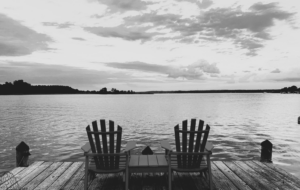Our succinct perspective on key investment and wealth-related issues.
Planning strategies to keep the peace
One of the best kept secrets in North America is the Muskoka Lakes. Ontarians know them. New Yorkers, too. But much of the rest of the continent is blissfully unaware of the watery treasure that resides just north of Toronto: the system of pristine lakes, interconnecting rivers and cottages that stretch out for kilometers; how it feels to wake up early in the morning, pour a coffee and sit outside on the dock, to watch the sun and mist rise over surrounding white pine and red maple woods. There are fewer finer moments in life. Ontario lake culture is some of the best summer culture in the world.
In one spot, though, is a curious sight. Near a popular golf course amid three-, five- and 10-million-dollar properties, sits something strange – a historic cottage covered in blue tarp.
This cottage is owned by two relatives (a property bequeathed from an earlier generation). Relative One lives in Canada, makes decent income, and wants to sell the cottage. Relative Two lives in the US, earns less income, and refuses. The two men are locked in what might be called a vacation-home stalemate — neither side willingly cedes ground.
According to local legend, years ago, the cottage needed work to prevent further water damage, but the American relative refused to contribute funds. That’s when the tarp went up. “Love what they’ve done with the place”, neighbours would joke as they passed by the obvious blight.
Absurd though the story sounds, the situation is more common than one might think. Vacation homes almost always start as places of fond memory and happiness, but can quickly become serious sources of family anxiety, drama and contention when the transfer of property to the next generation is poorly executed. Families who want to keep their homes happily in the family should plan, keeping tax planning, probate considerations, and interpersonal dynamics in mind.
Tax
Imagine owning a beautiful lakefront property that you purchased for $500,000 years ago that is now valued at $2.5 million. If that cottage is to be passed to your heirs, there is a deemed disposition on death and a tax bill that must be paid. Using simple math, for an Ontario resident, this bill could be North of $500,000 ($2.5 million market value – $500,000 purchase price, multiplied by the 50% capital gains inclusion rate and applied to your 53.5% marginal tax rate). Ouch.
There are two common strategies families can employ to pass on the cottage and minimize their tax burdens: opportunistically timing a gift (or sale) to heirs and using the principal residence exemption.
In gifting or selling the property within the family, capital gains are still realized. Therefore, it’s best to time the transaction to coincide with either (1) a year of lower net income (for the gifter/seller) or (2) weakness in the property market. Because marginal tax rates increase as income increases, selling or gifting a cottage during a year when the income is lower can result in a lower applied marginal tax rate and, therefore, a lower tax bill on the capital gain. In a similar vein, it can be beneficial to gift (or notionally sell) the cottage to your heir(s) when the property market is weaker, as a lower market value on disposition translates to less in capital gains.
Another option for Canadian residents is using the principal residence exemption. Under this exemption, homeowners can be shielded from paying capital gains taxes on the sale of their homes. It can also be applied to variety of types of homes, including cottages and even mobile homes meeting certain criteria.[i] Depending on your tax situation and estate planning objectives, it may be advantageous to apply the exemption to your cottage, instead of your home. Be sure to speak to a tax advisor or your financial advisor to learn more.
Probate Considerations
The default way to pass down a vacation home is through your will in a process known as probate. Probate is a legal process that takes place after someone dies, which involves validating and distributing assets according to their will. However, in exchange for administering the probate process, provincial governments levy a fee against the value of assets – including the family cottage. As of 2023, the associated probate fee on a property worth $2.5M in Ontario would be around $36,750.[ii]
In addition to the fee, probate records are public. So, in sensitive situations (such as where there is a dispute between beneficiaries) or when discretion is a priority, it may make sense to steer clear of probate and avoid the potential for “prying eyes”.
One popular strategy to avoid probate is to own property in joint tenancy. In joint tenancy, each owner has an equal share of the property and has the right to occupy and use the entire property. When one owner dies, ownership continues seamlessly with the surviving tenant(s).
The application to estate planning and your cottage might be to consider holding it in joint tenancy with your heir(s), with the main advantage of being able to pass the cottage to surviving owners without probate. However, when parents are entering joint tenancy with adult children, further consultation is required to avoid potential pitfalls. One such peril is the presumption of resulting trust, where it is presumed that the property, even in joint tenancy, is held “in trust for” – or in favor of – the parents’ estate. Other beneficiaries of the estate could present a challenge. Therefore, it is crucial to work with an estate lawyer to ensure the plan to avoid probate via joint tenancy does not get derailed.
Family Dynamics
From an ownership and practical standpoint, family dynamics are also an integral factor in passing down the family cottage. In fact, in our experience, it is the most important factor.
In some families, only one child will want to use the cottage regularly and could afford to keep it. In others, everyone will want to be involved. Some families have members who are estranged, while others have members with dramatically different financial circumstances. The unique circumstances of every family should inform what actions need to be taken with the vacation home.
How to guard against breakdowns in family dynamics and keep the peace? There are several tools available to families. The first and most obvious is to review your estate plan regularly, especially if there is a change in family dynamic. Events that warrant an estate plan review include marriage/remarriage, divorce, unexpected death, and souring relationships. Every time something material happens, it’s a decent invitation to review affairs.
Many families opt to use trusts to help control the flow of assets, ensure that funds are used as intended, and protect the interests of the beneficiates. Trusts are often a good starting point. However, trusts often lack the rule detail necessary to prevent conflict when dynamics are strained– that’s where a co-ownership agreement comes in.
A co-ownership agreement is a legal document that defines rules and responsibilities regarding a property. In addition to a trust, it can be a powerful tool for families to use. Co-ownership agreements stipulate details that help everyone share the cottage, which go beyond basic trust documents – including decisions like funding repairs and renovations, mortgage and tax payments, usage of the property, etc. They can materially help.
Start to plan now
In our experience at Focus, the transfer of a family vacation home comes with unique challenges that warrant careful review and planning. Discussions around who is capable and willing to look after a property should be started early, as well as the potential tax and financial scenarios. Initiating those conversations with your family and advisors can help prevent bitter feuds, unexpected bills and the worst-case scenario of losing the property. Want to get this process started? Our team at Focus is available to guide you.


